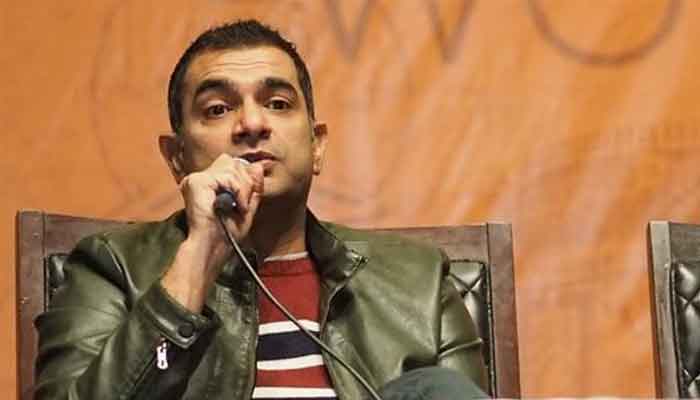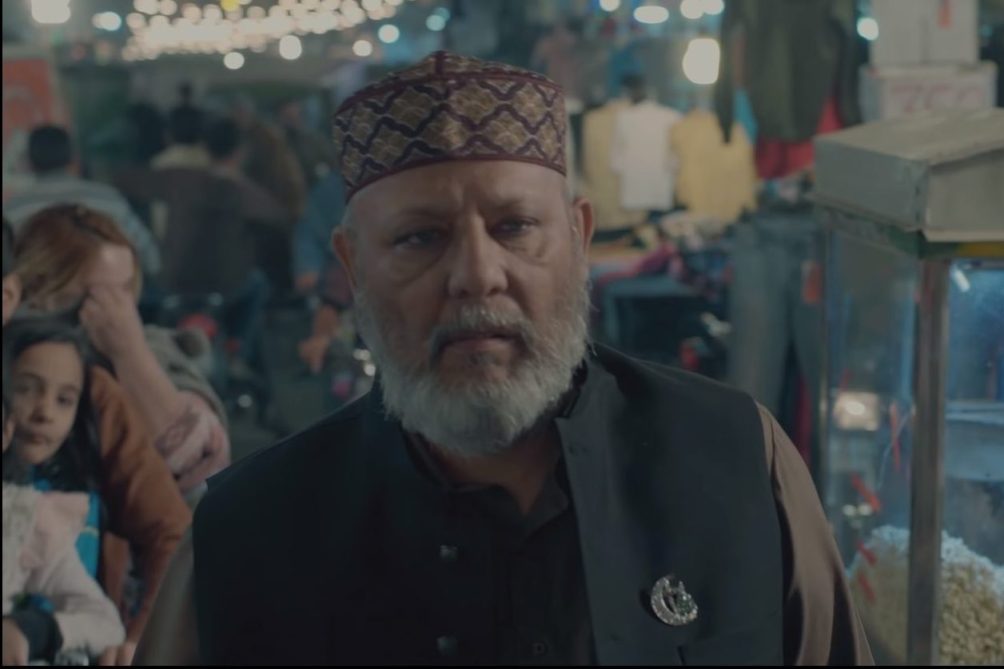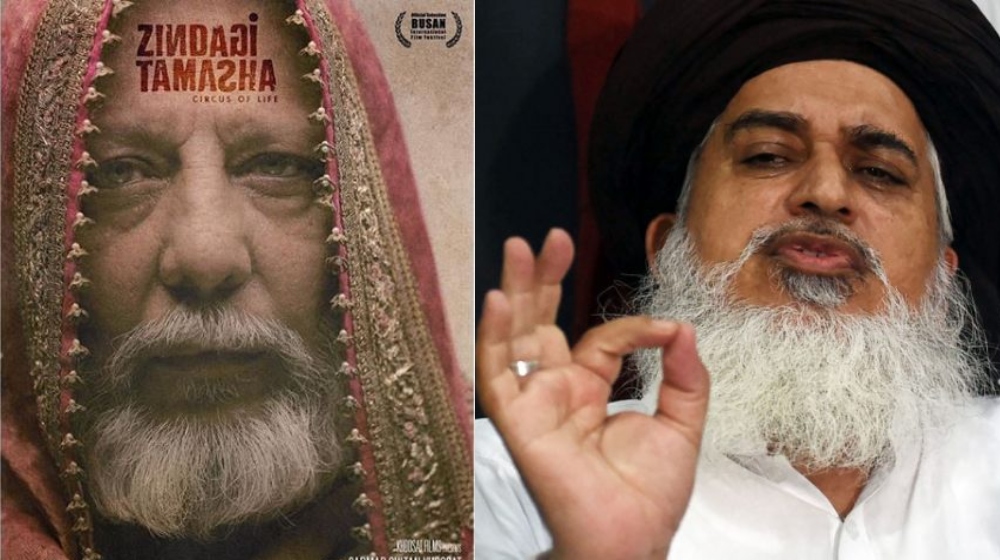Zindagi Tamasha Review

It is hot in Dallas, December is unseasonably warm, again, and the shawls and sweaters we had layered on our clothes after a slight cooling in the evening breeze, feel heavy and forced. We are headed to see Zindagi Tamasha, a film made by one of Pakistan’s most iconic directors, Sarmad Sultan Khoosat, the instantly recognizable director of Humsafar. Humsafar, a simple but beautifully intimate drama that can claim to have kickstarted the film careers of its two leads and cemented a place in Pakistan’s entertainment history.
“Who is the director “asked Shella, exhausted from her morning clinic, she had mustered up the energy to join us, even volunteering to drive the 1 hour, thirty minutes to the fancy Independent film theater that was hosting the showing.
“Sarmad, Sarmad Khoosat” I piped up
“Humsafar Wallah ?” Despite a wide body of work in theater, film and television, Khoosat is always remembered for the drama Humsafar first.
“Have you seen Shehre Zaat or Akhri Station ?” Mona, the other passenger, asked.
“Nahi , wait yes I think so. Is that one where Mahira Khan’s husband leaves her and she gets very religious ? You know I can never remember the name of these people but it was really good. Sadaf You always know so much more about these things.”
“Yes I’m a bit of an addict, I wish you would watch Jalpari that was amazing.. “
“Yes and there was Ashk,” said Mona Her voice hardening a little “but Manto was the best! We watched that a special screening too , remember, Sadaf ?”
“Is it a new movie, was it a big hit ?” , Shella Wanted to know .
“No not so new. I think its banned in Pakistan”
“Why ?”
The film started at 7:30 sharp, but not before the sponsers, Radio Azad, had given us a short rather pointed homily on punctuality; even now people were texting them in typical Pakistani style to delay the beginning because they were stuck in traffic. To everyone’s relief the sponsers were having none of it, and the late arrivals had to slink in hurriedly, picking their way into seats by the dim light of the screen.
Suddenly we were in the cold, smoggy back streets of a wintery looking Lahore, an ancient city that perseveres, and may even triumph again, despite the fault lines of religion, inept politicians and ever widening economic disparity. Arif Hassan plays Rahat Khwaja a simple man, whose main source of income is showing small properties in and around the historic areas of this medieval city. His real happiness lies in singing Naaths or poems in praise of the Prophet Mohammad (SAW) and after years of hard work he has reached a high point. If all goes well he will soon release an album of his work.
Khawaja is a devoted husband who patiently cares for his sick wife (Sammiya Mumtaz) and has raised and married off three daughters. His daughter Sadaf (Eman Suleiman) works long shifts at a local Tv station, but she and her husband Danish (Ali Kureishi) still makes time for her parents, especially her slowly dying mother. The older couple make a wonderful pair, their house maybe a cramped few rooms, their lives limited by finances and debilitating sickness, but the camaraderie and affection of their relationship shines through like a guiding light pulling them over every hurdle.

Khawaja’s mistake is not a big one but it is life changing. He is an inadvertent victim of the kind frothy social media fame that many strive for but ironically becomes a curse for the middleclass naatkhawan. Director Khoosat pieces together Khawaja’s story with a slow hand. Khawaja likes old Pakistani movies, especially the bold, sexy songs of Pre Zia era Pakistan that seem impossible in todays conservative society. He had danced as a child but those wild expressions were beaten out of him and conformity settled in. When Khawaja does let loose, his overweight, middle aged body, uninhibitedly swaying to the outrageous, hypnotic music of the seventies, it should have been a quick, private embarrassment. Instead he becomes an overnight internet sensation when his neighbor’s son uploads the video to Youtube. Suddenly, those few minutes come to define him instead of all the years of dependable conventionality. His daughter is too embarrassed and angry to speak to him for becoming a caricature and meme, his neighbors ostracize and mock him, but most painful of all his career as a singer ends abruptly. The one person who can understand is his wife who laughs it off with characteristic kindness and humor.
Disinvited to all his usual haunts he wonders like a satellite without a focus. There are other invitations, to another parallel world, where men dance with each other at secret parties but all of this leaves Khawaja even more confused and angry. Director Khoosat uses the moment to infuse a little pathos and humor, donning a golden top and acting the femme fatal for an audience of strangers that seems dutifully enraptured by his moves.
Zindagi Tamasha gives us a clear picture of the power of belonging and the pain of not belonging, the unknowing arrogance of being part of the acceptable majority and the terrible loneliness and frustration of becoming the “other”.
Proforma, public displays of piety divorced from true spirituality or even reason have become a norm, and this story illustrates it flawlessly. The celebration of The Prophet’s birth is the high point of Khawaja’s year but the compassion and mercy he sings about is nowhere to be seen. The alim he asks for help wants to mock and use him, and when Khawaja challenges him, threatens him with a blunt, cold-eyed accusation of Blasphemy. The horror and fear in that one scene can only be understood in the terms of the British era Blasphemy laws that still haunt Pakistan. Although the law has little to know basis in actual Islamic jurisprudence, rhetoric from manipulative politicians and religious leaders have turned it into a touchstone for intolerance and the worst kind of vigilante blood lust. Once an accusation is leveled, a strange mob mentality becomes rampant and even if the courts clear a person they may be lynched or wait in limbo for years in prison while their case is decided.
This is a slow but almost painfully beautiful movie at times, but it could have been even better without the greying filter and if it were a little shorter. The script is inspired by the real story of a cleric who was similarly ostracized when a risqué dance video of him was released. The world laughed and moved on. The cleric presumably could not, because like Khawaja, he released a full-blown apology, begging forgiveness for “hurting” people’s sentiments and his own “disgusting” behavior, despite doing nothing more than dance fully clothed, and that too not in public.

The song “Zindagi Tamasha Bani” is from a Pakistani, Punjabi film, translating to “my life has become a circus, a joke for the world “is used to great effect. The music subtly reconnects the audience with the forgotten creativity and more open spaces of the past while encapsulating Khawaja’s predicament with deadly accuracy. This tune is seeded throughout the narrative, its tempo changing to capture the changing moods of the protagonists. Perhaps the most moving sequence is a disappointed Khawaja , finding his way home after being ejected from the meeting, the poem of praise he had planned to sing plays in the background as he searches for the much mentioned mercy and compassion that is denied to him by those who claim to represent these lofty ideals.
A restrained performance of quiet courage and depth from Arif Hussain is the backbone of this feature and cannot be appreciated enough. Sammiya Mumtaz is an outstanding actress and brings a touch of light to her role as the invalid wife. Eman Suleiman as the angry, confused daughter and Nadia Afghan as the typical, jaded Morning show host are the other standouts among a talented cast that has brought all their characters to life.
Khoosat’s last stroke of genius is the final argument between father and child. Khawaja demands his wife’s old clothes back and Sadaf throws a suitcase at his feet, effectively blocking her father out of her life when he needs her the most. We leave Khawaja rocking gently to the same songs that cost him so much, wearing his wife’s cardigan and hat. Those voices and images on the screen are where his heart lies and ultimately his most faithful companions. It is later, as the ambiguity of the scene seeps in and out of the mind that the idea that Khawaja may not just be remembering his wife but actually enjoying the “borrowed femininity” of his wife’s clothes as much as he enjoyed the attributively “feminine” dance moves begins to suggest itself. Khawaja may have just begun a journey to understanding himself. The fluidity of gender and identity is hinted at but never elaborated.
The drive home is faster, the streets of Dallas are have become emptier by the late evening as commuters reach their homes.
“That was a wonderful film” says Shella as she maneuvers on to the highway, opting out of the computer navigation and following her own sense of direction.
“Is it a new movie, was it a big hit?” , Shella Wanted to know .
“No not so new. I think its banned in Pakistan”
“Why, why would they ban such a sweet movie, honestly it was so real and really made me think”
“Religious sensibilities” I reply, looking out and praying we didn’t miss the exit for the highway.
Mona Looked up from the message she had just been texting her son, and said “You know exactly why, Haven’t you seen the news about Sialkot? This mob murdered a man over a sticker”
“That’s horrible, I can’t believe normal people can do that, no wonder they are being careful. It is such a shame” answers Shella.
“Politics and religion are always a dangerous mix.” I cut her off with a truism, unwilling to even open up the discussion, outraged to the point I have lost the will to go into details that will only reignite my disgust .
We sit in silence, mulling over the violent scenes of a crazed mob that had lost all reason, while one man out of hundreds tried to stop them.
” Oh, and by the way this is an Oscar entry. Good enough for everyone to watch but not the average Pakistani according to religious leaders” I add.
“Look at these people, they are so cruel! These people claim to be lovers of The Prophet (saw), I mean he was incredibly kind and forgiving if only there was a way to show them “said Mona
“if only there was a way “, I replied.

Tehreek-e-Labbaik Pakistan (TLP) chief Khadim Hussain Rizvi has said that he would do anything to stop the release of Sarmad Khoosat’s upcoming film Zindagi Tamsha. He said “the film will release over my dead body.”
indagi Tamas

“Our state is afraid of ulemas and emotions of people. If they take up this issue their seats would be in danger. But it’s time ulemas and politicians step forward to tackle this issue. They should tell the masses that blasphemy is against the Prophet’s (PBUH) teachings, it is not Allah’s message or Islam’s message.”
“Our state is afraid of ulemas and emotions of people. If they take up this issue their seats would be in danger. But it’s time ulemas and politicians step forward to tackle this issue. They should tell the masses that blasphemy is against the Prophet’s (PBUH) teachings, it is not Allah’s message or Islam’s message.”
Sadaf Haider


While Pakistan has always extended support to the region at micro and macro issues, the incidents of 1971 left a scar on image of the country. Through exclusive interviews of eye witnesses, authors, politicians, war veterans and rare archival footage, the documentary series traces in-depth and first account narratives outlining the reasons as well as events leading up to the Indian sponsored rebellion in East Pakistan, with the eventual creation of an independent state of Bangladesh. Watch JHAUR | War of 1971 on the YouTube Channel below. Episode 3 Promo Out Now
LikeLike
While Pakistan has always extended support to the region at micro and macro issues, the incidents of 1971 left a scar on image of the country. Through exclusive interviews of eye witnesses, authors, politicians, war veterans and rare archival footage, the documentary series traces in-depth and first account narratives outlining the reasons as well as events leading up to the Indian sponsored rebellion in East Pakistan, with the eventual creation of an independent state of Bangladesh. Watch JHAUR | War of 1971 on the YouTube Channel below. Episode 2 Out Now
LikeLike
While Pakistan has always extended support to the region at micro and macro issues, the incidents of 1971 left a scar on image of the country. Through exclusive interviews of eye witnesses, authors, politicians, war veterans and rare archival footage, the documentary series traces in-depth and first account narratives outlining the reasons as well as events leading up to the Indian sponsored rebellion in East Pakistan, with the eventual creation of an independent state of Bangladesh. Watch JHAUR | War of 1971 on the YouTube Channel below. Episode 1
LikeLike
I came across this interesting video “Revealing the Truth and Busting the Myths about the subdivision of Pakistan”
WATCH THE Trailer | JHAUR | WAR OF 1971 | Official Trailer | Documentary Series
https://bit.ly/3qWNUM1
LikeLike
While Pakistan has always extended support to the region at micro and macro issues, the incidents of 1971 left a scar on image of the country. Through exclusive interviews of eye witnesses, authors, politicians, war veterans and rare archival footage, the documentary series traces in-depth and first account narratives outlining the reasons as well as events leading up to the Indian sponsored rebellion in East Pakistan, with the eventual creation of an independent state of Bangladesh.
WATCH THE TEASER 2 JHAUR | WAR OF 1971 | DOCUMENTARY
LikeLike
I came across this interesting video and thought of sharing. This is related to the atrocities of 1971 war. MUST WATCH this interesting video
https://www.youtube.com/channel/UCPvClhYfZJh82PlaH__y6qg
LikeLike